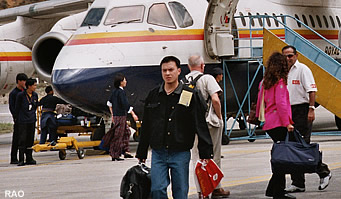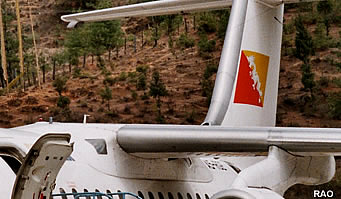 |
Bhutan's
Tourism: Trekking |
|
 |
Bhutan Information |
|
|
 |
|
Shopping
in India: Off to Guwahati - Guwahati is more than a shopping destination
|
 |
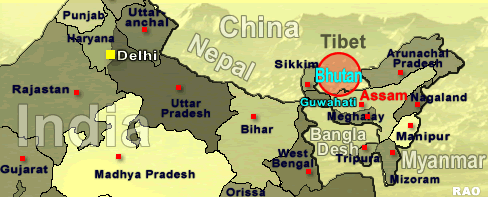 |
| Guwahati,
the largest city in the neighbouring Indian state of Assam, is a three-hour
drive, about a 100 kilometres, from the border town of Samdrup Jongkhar.
Besides
being the source of goods needed by the eastern districts Bhutanese visit
Guwahati for specialized medical treatment. |
|
Travel
to Guwahati almost came to a standstill in the late 90s and early 2000
because of the tense security situation. Even today the direct bus service
to Guwahati from Samdrup Jongkhar has not been revived and people do not
take their own cars to the city.
But
Bhutanese are once again increasingly visiting the city that lies on the
banks of Bhramaputra river and is the gateway to India's northeastern states
where a number of Bhutanese students pursue college education.
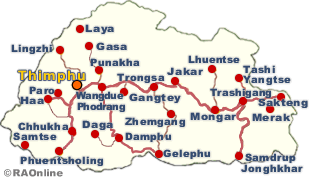 |
| Businesswoman
Sonam Choden who sells stationeries, computer accessories and sports goods
in Samdrup Jongkhar is a regular traveler to Guwahati. She hires Indian
vehicles for Nu.1,300 to Nu.1,700 a day to get there and return in the
evening.
Wearing
light cottons she and her niece are ready to make a trip. By 7:15 am they
wait in front of their house in Samdrup Jongkhar to be picked up by a Mahindra
Bolero bearing an Indian number plate. |
|
After
almost three hours drive through heavy traffic and a bumpy road the jeep
crosses the picturesque Bhramaputra bridge to enter the bustling city of
Guwahati.
Sonam
Choden and her partner step out into a crowded street and enter a departmental
store where they are greeted by a face behind the counter.
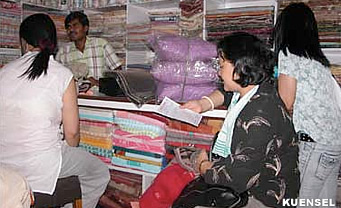 |
| Here's my list: Bhutanese shoppers in Guwahati |
| The
commercial hub of eastern region, Samdrup Jongkhar, is struggling to regain
its former vibrancy. The business community says they are suffering from
lack of customers.
Thromde
thueme (muncipal representative), Norbu Wangdi, said that business was
slightly better during winters when students were on vacation. "Some of
the hotels hardly function during the summer season," he said. The sweltering
heat in recent months has also kept the customers away from the town. |
|
As
a strategy to improve business Norbu Wangdi said that proposals were being
drafted to make the town a tax free zone to lift it out of difficult times.
In
another corner of the departmental store, Pem, a corporate employee and
her two children are busy gulping chilled lassi (sweetened curd). They
are on a holiday and have come all the way from Trashigang.
Bhutanese
frequent the shopping areas like Pan bazaar and Fancy bazaar and Down Town
Kumar Nursery, and GNR hospitals for check up and treatment. Those on a
holiday also visit the aquarium, the zoo, and temples like Kingaphodrang.
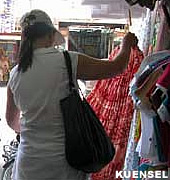 |
| But
it was the availability of cheap and variety of items that largely draw
Bhutanese to Guwahati. "I come here for shopping thrice a month," said
Sonam Choden, who had been making visits for the past 20 years.
According
to her, there already existed a long-standing arrangement with suppliers
in Guwahati. "If we don't have enough money we take things on credit,"
she said. |
|
According
to Kezang Norbu, the proprietor of a wood based industry and furniture
house in Samdrup Jongkhar, Guwahati had grown ten folds ever since his
first visit in early eighties. "We used to take our family for shopping
and medical check up. But things have changed over the years and we do
not feel very safe to take the family there now," said Kezang.
Parshoram,
a gup from Dalim in Samdrupcholing, said that many villagers also preferred
to buy farm machinery spares from Guwahati. "It is cheaper than the ones
sold by the government and there are no lengthy procedures involved," he
said.
Jambay,
25, another shopkeeper in Samdrup Jongkhar, said that prices of goods were
slightly higher in Guwahati than other places like Siliguri and Kolkata.
"But we prefer to go there because it is nearer," she said.
She
added that during the height of the security problem when travel to Guwahati
was risky they made deals over the phone and received goods from suppliers
on time.
While
most of the shoppers were from northeast India, shopkeepers in Guwahati
Kuensel spoke to say that Bhutanese customers contributed a lot to their
business. "We have both the wholesale and retail buyers coming from Bhutan,"
said Sunil of Oswal store, which supplied handbags. "And they are very
friendly customers."
However,
Bhutanese frequenting the city say that things would be more convenient
if they were allowed to use their personal cars. "Otherwise it calls for
extra expenditure," said Sonam, a mother of three.
Done
with their shopping Sonam Choden and her niece head back to Samdrup Jongkhar,
their cheeks flushed red because of the heat. "If only we could get rid
of the dust and the bad traffic it would be so much more fun," she said.
| Contributed
by Kesang Dema, KUENSEL, Bhutan's national newspaper, 2007 |
 |
|
more
information
|

|
|






